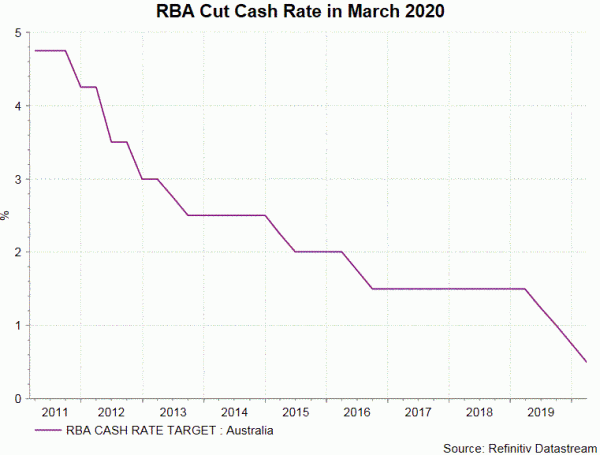RBA becomes the first central bank to cut interest rate in light of the negative impacts from the coronavirus outbreak. The central bank lowered the cash rate by -25 bps to 0.50% in March, expected to ease further in the near future. As revealed in the accompanying statement, the members worried that the pandemic could seriously hurt Australia’s economy, which has already got hammered by bushfires in summer. While tourism and the education industry would be negatively affected, spread of the virus at home would lead to decline in domestic demand as citizens stay at home to avoid social contact and are concerned about the economic outlook.
The members acknowledged that the coronavirus outbreak “is having a significant effect on the Australian economy at present, particularly in the education and travel sectors”. The uncertainty over when the global spread will be contained is “likely to affect domestic spending”, causing the 1Q20 GDP growth “noticeably weaker than earlier expected”. RBA, however, indicated that “once the coronavirus is contained, the Australian economy is expected to return to an improving trend”. Yet, it remains uncertain when the situation will stabilize.
Lowering the unemployment rate to a long-term target of about 4.5% was a key goal for RBA’s rate cuts in 2019. The central bank noted that “the unemployment rate increased in January to 5.3% and has been around 5.25 per cent since April last year”.. the members also took note of the “subdued” wage growth, not expecting it to pick up for some time”. The members also suggested that “a gradual lift in wages growth would be a welcome development and is needed for inflation to be sustainably within the 2–3% target range”. Bringing back the unemployment rate to the long-term target would still be RBA’s goal this year
As we mentioned in the preview, financial stability is a key part of RBA’s monetary policy stance. It attempts to strike a balance between boosting growth and avoiding excessive rise in housing prices. In the March meeting, RBA noted that the price gains in ‘some markets’ as ‘quite strong’. It reiterated that “mortgage loan commitments have also picked up, although demand for credit by investors remains subdued. Mortgage rates are at record lows and there is strong competition for borrowers of high credit quality. Credit conditions for small and medium-sized businesses remain tight”.
Regarding the decision to lower the policy rate, RBA noted that “the global outbreak of the coronavirus is expected to delay progress in Australia towards full employment and the inflation target”. As such, it was “appropriate to ease monetary policy further to provide additional support to employment and economic activity”. The central bank pledged to “continue to monitor developments closely and to assess the implications of the coronavirus for the economy” and be “prepared to ease monetary policy further to support the Australian economy”.

